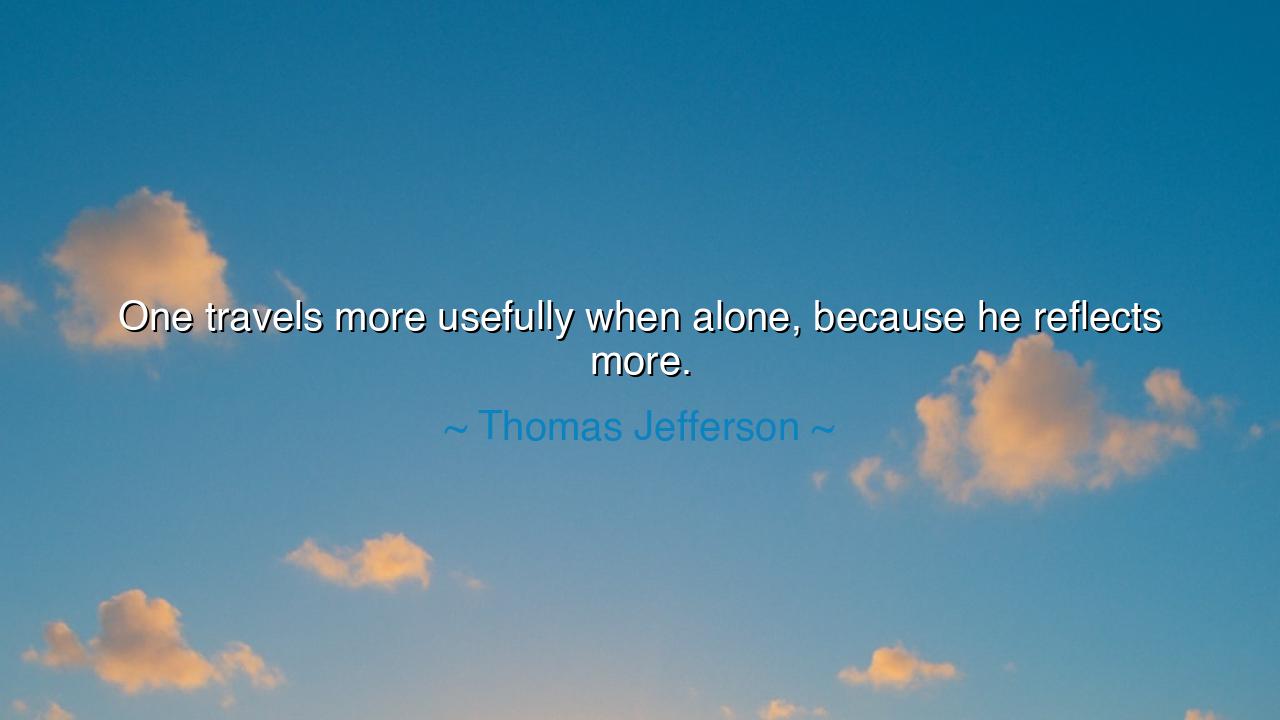
One travels more usefully when alone, because he reflects more.






“One travels more usefully when alone, because he reflects more.” — thus wrote Thomas Jefferson, philosopher, statesman, and seeker of enlightenment. His words, though simple, hold the weight of an ancient truth: that solitude deepens understanding. In this reflection, Jefferson reveals that the journey of the body is only half the pilgrimage; the journey of the mind completes it. When a man walks the earth alone, he becomes not just a traveler through lands but a traveler through himself. Every mountain becomes a mirror, every road a question, every silence a teacher.
The origin of this quote lies in Jefferson’s own habits as a scholar and wanderer. Though a man of public service, he was also one of quiet introspection. During his years abroad in France and his correspondence with philosophers of the Enlightenment, Jefferson often withdrew from company to walk alone through gardens, libraries, and streets. He saw that while conversation entertains, solitude instructs. To travel with others is to share laughter and distraction; to travel alone is to listen — to the voice of history, of nature, and of the soul. The usefulness of solitude, to Jefferson, was not in the distance covered, but in the depth attained.
To reflect is to travel inward. When one moves through the world without the constant chatter of companions, the mind awakens to its own dialogue. The mountains no longer echo with conversation but with thought. The river’s flow becomes a symbol of time, and the ruins of the past become whispers of eternity. In solitude, perception sharpens: a man begins to notice the pattern of the stars, the music of the marketplace, the faces of strangers whose lives unfold briefly before his eyes. Such reflections, Jefferson believed, cultivate wisdom — for the world, when seen in silence, speaks its hidden truths.
Consider Alexander von Humboldt, the great explorer of the 19th century, who journeyed alone through the jungles of South America. Though he was surrounded by beauty and danger, he often preferred solitude to company. It was in those solitary moments — amid the dense forests and the vast silence of the Andes — that he made his greatest insights into nature’s unity. He wrote that the earth was “a living whole,” a thought born not from conversation, but from reflection in solitude. Like Jefferson, Humboldt knew that travel is not merely movement, but meditation — that the eyes see clearer when the ears are still.
Yet Jefferson’s words also carry a gentle warning: that to travel usefully is not to flee from humanity, but to return to it wiser. The purpose of solitary reflection is not to isolate the self forever, but to refine it — to come back to the world with clearer vision, steadier judgment, and deeper compassion. The man who travels alone learns the measure of his thoughts; the man who returns from such a journey brings light to those who never left. In this way, Jefferson speaks not of loneliness, but of discipline of mind, a solitude chosen and fruitful.
There is a sacred rhythm in this kind of solitude. It strips away the noise of daily life, leaving only what is essential. The traveler alone learns patience, humility, and courage. Without companions, he must confront his fears directly; without distraction, he must face his own heart. Every sunrise becomes a conversation between himself and the universe. And in this dialogue, he discovers not only new lands but the geography of his own spirit. Such reflection is the forge where insight and gratitude are born.
The lesson, then, is clear: to grow wise, one must sometimes walk alone. Seek moments of solitude — not as escape, but as return. Step away from the clamor of crowds and wander, if only in thought, through the landscape of your mind. Observe, listen, and let silence teach you. When you travel, whether across oceans or within your own heart, remember Jefferson’s truth: companionship delights, but solitude enlightens.
So let these words echo as you journey through life: “One travels more usefully when alone, because he reflects more.” Do not fear solitude, for it is not emptiness, but fullness — the space where wisdom takes root. Go forth into the world with open eyes, but go also into yourself with open heart. For in reflection, the traveler discovers that the greatest voyage is not from place to place, but from thought to understanding, from seeing the world to truly knowing one’s place within it.






AAdministratorAdministrator
Welcome, honored guests. Please leave a comment, we will respond soon